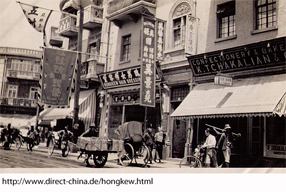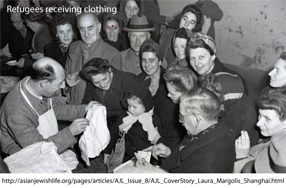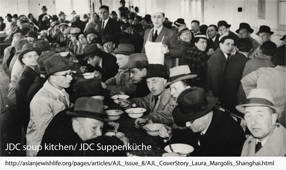
Shanghai became a save heaven for 17,000 refugees from Germany. After 1937 Jews were not allowed to take more than 10 RM out of the country. As poor refugees they were not welcome in the rest of the world. Shanghai was mostly occupied by Japan. Even Japan was an alley of Germany in 1938 Japan decided not to refuse the refugees in order not to jepeardize their relation to the US. So became Shanghai the last place where Jews didn't need a visa or a fortune for the immigration. But because of the bad living conditions Shanghai was allways the last option.
After Reichskristallnach many had family members who were arrested and had only a chance to get released if they could proof that they would emigrate as soon as possible. In this situation tickets to Shanghai became so valuable that they were traded at horrendous prices on a black market.
The refugees fled often via Triest, Vencie or Genua further to Colombo and from there to Shanghai. The see-passage was surreal for many refugees. Because the board-money didn't belong to the 10 RM which were allowed to take out, many refugees changed money into board money which the couldn't take from board later. So they could spend a lot of money on board, had a luxious passage and knew that they would arrive without any money in a strange new world.
Shanghai was not prepared for so many refugees. There was only a small jewish community. Jewish refugee organisations tried to implement a infrastructure as soon as possible. Most Jews were accomondated in Hongkew, a neighbourhood which was destroyed in the Japanese/Chinese war only two years earlier. The living conditions were very poor.Only some Jews were able to find jobs or to open own shops or to find flats.
In mid 1939 Shanghai was so overburdend that it also tightened its entry requirements. When Italy entered the war, the see-passage was closed. Only a few Jews could flee overland via the transibirian railroad. When Japan entered the war, this route was also not possible any longer.
After Japan entered the war, also the situation in Shanghai became worth. The refugee organisations couldn't help any longer. More than 6,000 people were close to death by starving.
In 1943 the German Nazis tried to force Japan to extradite the Jews or to build extermination camps itself. Japan refused but established a Ghetto in Hongkew. All Jews who had immigrated after 1937 had to move and to relocated there buisinessto Hongkew a small neighborhood where already 100.000 Chinese people were living. The living conditions became even poorer.
The ghetto was not freed before September 1945. But even then the Jews couldn't emigrate because still nobody was ready to allow them the immigration. The last left Shanghai not before 1950, after the foundation the peoples republik of China.




